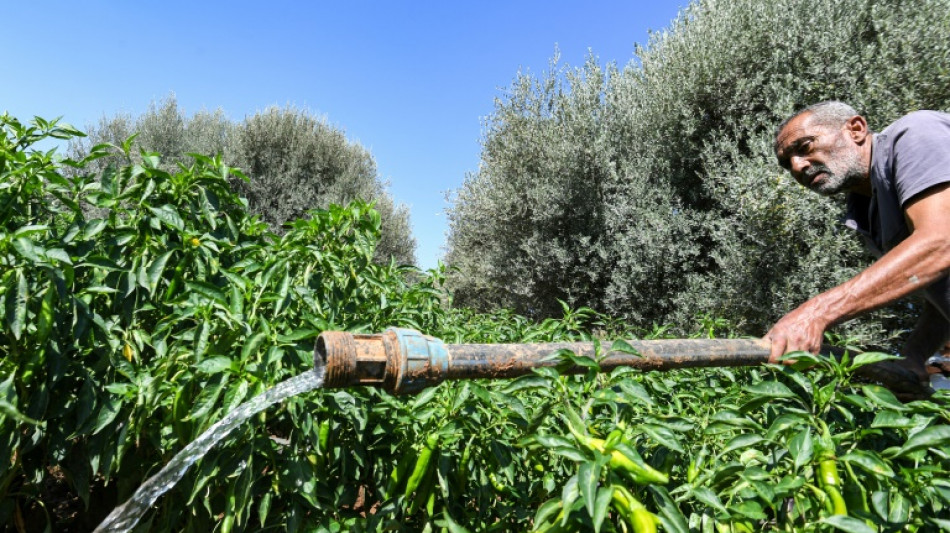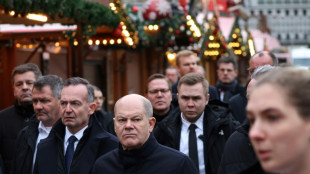
-
 Minorities fear targeted attacks in post-revolution Bangladesh
Minorities fear targeted attacks in post-revolution Bangladesh
-
Tatum's 43-point triple-double propels Celtics over Bulls

-
 Tunisia women herb harvesters struggle with drought and heat
Tunisia women herb harvesters struggle with drought and heat
-
Trump threatens to take back control of Panama Canal

-
 India's architecture fans guard Mumbai's Art Deco past
India's architecture fans guard Mumbai's Art Deco past
-
Secretive game developer codes hit 'Balatro' in Canadian prairie province

-
 Large earthquake hits battered Vanuatu
Large earthquake hits battered Vanuatu
-
Beaten Fury says Usyk got 'Christmas gift' from judges

-
 First Singaporean golfer at Masters hopes 'not be in awe' of heroes
First Singaporean golfer at Masters hopes 'not be in awe' of heroes
-
NFL-best Chiefs beat Texans while Ravens clinch playoff spot

-
 Usyk beats Fury in heavyweight championship rematch
Usyk beats Fury in heavyweight championship rematch
-
Stellantis backtracks on plan to lay off 1,100 at US Jeep plant

-
 Atletico snatch late win at Barca to top La Liga
Atletico snatch late win at Barca to top La Liga
-
Australian teen Konstas ready for Indian pace challenge

-
 Strong quake strikes off battered Vanuatu
Strong quake strikes off battered Vanuatu
-
Tiger Woods and son Charlie share halfway lead in family event

-
 Bath stay out in front in Premiership as Bristol secure record win
Bath stay out in front in Premiership as Bristol secure record win
-
Mahomes shines as NFL-best Chiefs beat Texans to reach 14-1

-
 Suspect in deadly Christmas market attack railed against Islam, Germany
Suspect in deadly Christmas market attack railed against Islam, Germany
-
MLB legend Henderson, career stolen base leader, dead at 65

-
 Albania announces shutdown of TikTok for at least a year
Albania announces shutdown of TikTok for at least a year
-
Villa heap pain on slumping Man City as Arsenal sparkle

-
 Laboured Napoli take top spot in Serie A
Laboured Napoli take top spot in Serie A
-
Schick hits four as Leverkusen close gap to Bayern on sombre weekend

-
 Calls for more safety measures after Croatia school stabbings
Calls for more safety measures after Croatia school stabbings
-
Jesus double lifts Christmas spirits for five-star Arsenal

-
 Frankfurt miss chance to close on Bayern as attack victims remembered
Frankfurt miss chance to close on Bayern as attack victims remembered
-
At least 38 die in bus accident in southeastern Brazil

-
 NBA fines Celtics coach Mazzulla and Nets center Claxton
NBA fines Celtics coach Mazzulla and Nets center Claxton
-
Banned Russian skater Valieva stars at Moscow ice gala

-
 Leading try scorer Maqala takes Bayonne past Vannes in Top 14
Leading try scorer Maqala takes Bayonne past Vannes in Top 14
-
Struggling Southampton appoint Juric as new manager

-
 Villa heap pain on slumping Man City as Forest soar
Villa heap pain on slumping Man City as Forest soar
-
Suspect in deadly Christmas market attack railed against Islam and Germany

-
 Biden signs funding bill to avert government shutdown
Biden signs funding bill to avert government shutdown
-
At least 32 die in bus accident in southeastern Brazil

-
 Freed activist Paul Watson vows to 'end whaling worldwide'
Freed activist Paul Watson vows to 'end whaling worldwide'
-
Chinese ship linked to severed Baltic Sea cables sets sail

-
 Sorrow and fury in German town after Christmas market attack
Sorrow and fury in German town after Christmas market attack
-
Guardiola vows Man City will regain confidence 'sooner or later' after another defeat

-
 Ukraine drone hits Russian high-rise 1,000km from frontline
Ukraine drone hits Russian high-rise 1,000km from frontline
-
Villa beat Man City to deepen Guardiola's pain

-
 'Best ever' Odermatt soars to Val Gardena downhill win
'Best ever' Odermatt soars to Val Gardena downhill win
-
'Perfect start' for ski great Vonn on World Cup return

-
 Germany mourns five killed, hundreds wounded in Christmas market attack
Germany mourns five killed, hundreds wounded in Christmas market attack
-
Odermatt soars to Val Gardena downhill win

-
 Mbappe's adaptation period over: Real Madrid's Ancelotti
Mbappe's adaptation period over: Real Madrid's Ancelotti
-
France's most powerful nuclear reactor finally comes on stream

-
 Scholz mourns 5 killed, hundreds wounded in Christmas market attack
Scholz mourns 5 killed, hundreds wounded in Christmas market attack
-
Ski great Vonn finishes 14th on World Cup return


With EU funding, Tunisian farmer revives parched village
With parched crops on one side and lush green plants on the other, a small farming project in northwest Tunisia demonstrates how foreign funding coupled with dogged local efforts can help tackle the impact of climate change.
A local dam built by woman farmer Saida Zouaoui in the village of Ghardimaou after years of effort has turned her into a local hero for her fellow smallholders, who say it helped increase their production despite a six-year drought.
Zouaoui's stone and cement dam was constructed with European Union funding and technical support from the International Labour Organization, illustrating how such assistance is helping vulnerable nations adapt to climate change.
The COP29 climate summit in Azerbaijan this November will focus on global funding by wealthier, high-polluting nations to help poorer countries adjust to a warming planet. But deep divisions remain over how much should be paid, and who should pay it
"We must adapt to climate change," Zouaoui, 44, said as she cleared fallen branches and debris from a stream flowing off the dam.
"We know the region and its water-related issues, but we must come up with solutions and not lose hope."
As a child, Saida Zouaoui saw both her father and grandfather attempt to build a makeshift reservoir using sandbags in her village of Ghardimaou near the Algerian border.
But without proper infrastructure and money, their effort failed.
In the meantime, Tunisia's water stress worsened.
- EU funding -
Already the 20th most water-stressed country according to the World Resources Institute, Tunisia has seen its national dams shrink to less than a quarter of their capacity, according to official figures.
In Zouaoui's village, traditional dykes provided irrigation for up to 48 hectares (117 acres) during the 1970s and 80s but that has shrivelled to only 12 hectares, Monaem Khemissi, Tunisia's ILO coordinator, told AFP.
Zouaoui said a number of farmers, and particularly younger people, left the village for urban areas.
Those who stayed were forced to "reduce cultivated areas and no longer planted crops that require a lot of water".
Zouaoui had pitched the idea of building the small dam to Tunisian authorities before her country's 2011 revolution but they turned it down as unprofitable, she said.
Heavily indebted Tunisia is grappling with weak economic growth.
"I understand the authorities have limited capabilities and do not have the financial resources to implement the idea as they have other priorities," Zouaoui told AFP.
But she persisted.
She told officials that her "lifetime project" would even "irrigate the entire area, for farmers to return and life to resume".
It was European Union funding that eventually provided 90 percent of the 350,000 dinars (around $115,000) needed to build her dam in 2019.
Local farmers contributed about 10 percent of the cost, according to the ILO, and also offered their labour and logistics.
The EU, the North African country's top aid and commercial partner, allocated $241 million in 2023 to support projects mainly linked to agriculture and water management.
Since 2021, the EU has also funded $18 million in rural development projects.
- 'Changed my life' -
ILO's Khemissi said Zouaoui's initiative was a "model of local development".
He said his organisation "does not aim to replace the state but rather offer technical and financial support for projects to combat climate change and create jobs in marginalised areas".
Tunisia's northwest, though impoverished, is one of its most fertile areas, known for its production of cereals and vegetables and home to the country's largest dam.
But with an unwavering lack of rainfall, Tunisia lost almost its entire grain harvest last year, according to official figures.
Water still flows, however, through Zouaoui's canals linked to her small dam, which is about the length of one-and-a-half Olympic-sized swimming pools, and three metres (10 feet) deep.
The system irrigates 45 small farms, each ranging from one to two hectares, with a rotation system among her farmer neighbours for free access to water.
Zouaoui said the farmers had nearly lost hope, feeling neglected by the authorities as "each time an official came to visit, the farmers thought they had come for electoral gain".
"I had to convince them that we will have water unconditionally," she said.
Abdallah Gadgadhi, 54, a father of five, recalled that his cultivated field "was reduced to a third before the project was completed" due to water scarcity.
With irrigation from Zouaoui's dam, he said, he has expanded his pepper crop to use around 70 percent of his land.
Rebah Fazaai, 58, said Zouaoui has "changed my life immensely".
"We can now support our families by selling our produce," she added.
F.Müller--BTB




